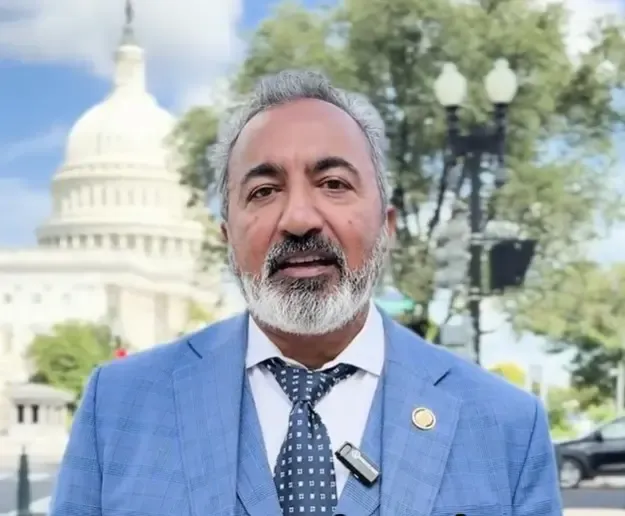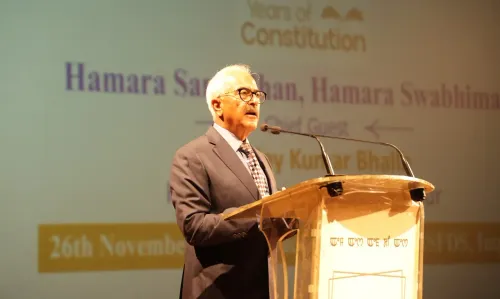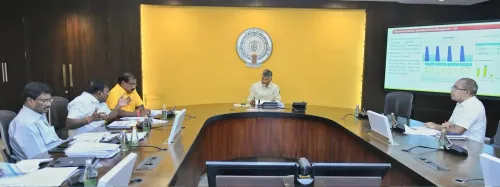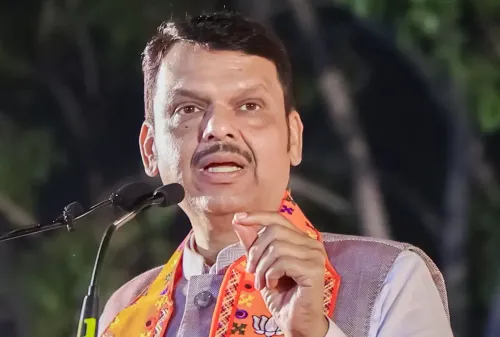Should the US Congress Unite to Safeguard India Relations?

Synopsis
Key Takeaways
- US Congress must unite to defend India-US relationship.
- H-1B visa issues pose challenges for the partnership.
- Bipartisan support is essential for future collaboration.
- India is a rapidly growing economy, vital for US interests.
- Clear strategy needed from the US administration.
Washington, Oct 11 (NationPress) Congressman Ami Bera, a Democratic House representative from California, has emphasized the necessity for the US Congress to “unite” in safeguarding the “critically significant” relationship between India and the United States.
In an exclusive conversation with IANS on Friday, Bera, who is the Ranking Member of the Subcommittee on East Asia and the Pacific, discussed his efforts to foster a bipartisan agreement regarding India-US relations, his recent Congressional trip to India, the H-1B visa issue, and the future trajectory of this bilateral partnership.
Below are some key insights from the interview.
IANS: You recently led a congressional delegation to India and engaged with officials and industry leaders. What was the sentiment you gathered amidst the current administration’s actions?
Bera: There were definitely some apprehensions among Indian government officials, particularly regarding the invitation of a Pakistani General to the Oval Office, which raised concerns. President Trump is taking credit for resolving the five tense days in May, but it was primarily the Indians and Pakistan negotiating.
Furthermore, the $100,000 H-1B visa fee is significant; India utilizes about 70% of H-1B visas, benefitting US companies, tech employees, and medical professionals that are crucial in the United States. From a Congressional viewpoint, there is substantial support for the US-India relationship.
We view it as a cornerstone not only of the Indo-Pacific strategy but also of global economics. India is currently the fastest-growing economy worldwide, and we aspire to enhance our business dealings with India. My hope is that we can achieve zero tariffs between the two nations and finalize a trade agreement.
IANS: How would you evaluate the Trump administration's approach to India over the past nine months?
Bera: I'm uncertain about the current India strategy, as it appears inconsistent. Initially, there was a strong connection between Prime Minister Modi and President Trump, suggesting a swiftly advancing relationship. However, the recent closeness with Pakistan has created confusion, particularly following the terrible terrorist attacks in April.
Additionally, the 50% tariff raises concerns regarding India's purchases of Russian energy, which we managed to navigate during the Biden administration. China imports more Russian oil than India, so it’s reasonable for Indians to question why they are being singled out. The H-1B situation also lacks clarity.
That being said, on the defense front, our visit to the Western Naval Command was very positive. I reaffirmed that significant American investments in Pakistan are unlikely anytime soon, whereas investments in India are flourishing. Our military collaborations are solely with India. We must overcome these hurdles, but Congress remains broadly supportive of a robust US-India relationship.
IANS: Would you say this reflects a Trump-specific policy rather than a broader US-India strategy, and likely an anomaly rather than the standard?
Bera: From my observations of President Trump during his initial months in office, his statements can change rapidly. It’s essential to monitor this situation.
Yet, I believe it's crucial for Congress, both Democrats and Republicans, to unite and clarify how we view the US-India relationship. We plan to introduce legislation to reaffirm that members of Congress acknowledge this relationship as “hugely significant” in the 21st Century.
IANS: A letter calling for President Trump to strengthen US-India ties was signed by 19 House Democrats on Wednesday, but no Republicans. What’s your take on their silence?
Bera: They seem hesitant to confront President Trump directly. Instead of focusing on Trump, let’s focus on the US-India relationship and what we, as members of Congress—both Democrats and Republicans—believe.
Now is an excellent time for the diaspora to engage. Once we establish a sense of Congress, they can approach their representatives and say, “You’ve long emphasized the importance of this relationship; here’s your chance to affirm it.” After the government shutdown, we will introduce that legislation, ideally in a bipartisan manner. The US-India relationship shouldn’t be a Democratic or Republican issue; it should be an American issue.
IANS: You mentioned that certain individuals influence India policy within the White House. Who are they, and how strong is the current India expertise?
Bera: This is concerning. In Trump’s first term, he had experienced political advisors in his cabinet. Secretary Rubio has been a strong supporter of the US-India relationship, but I’m unsure of his level of influence.
Individuals like Peter Navarro, who seem to have the president’s ear, have not been friendly toward India. Similarly, Stephen Miller, who appears to be shaping immigration policy, may be responsible for the H-1B approach. The rollout of this policy was poorly managed, suggesting a lack of consultation with Congress or industry.
IANS: What factors contributed to the administration’s decision to target the H-1B visa program despite its evident impact on critical sectors like technology and healthcare?
Bera: This doesn’t seem to be a well-considered policy. A thoughtful approach would involve consulting with Congress and industry to gauge the impact. Instead, it appears a few individuals within the White House made a miscalculated decision.
This could harm US industries, especially as many hospitals are struggling to recruit doctors. Numerous medical professionals in the US hold H-1B visas, so hopefully, this message reaches the President, leading to a reevaluation of this policy.
For instance, if I were a company like Microsoft, I might explore relocating operations to Hyderabad instead of dealing with this situation. Small startups in the US cannot afford $100,000 H-1B fees, so they might move their operations to India.
IANS: What’s your opinion on Sergio Gor, the newly confirmed US Ambassador to India? He is a close aide to President Trump but lacks regional expertise.
Bera: He articulated the right sentiments during his confirmation hearings. Since then, he has also spoken positively about a strong US-India relationship. His proximity to President Trump may facilitate better communication with Indian officials, allowing him to witness the vibrancy of India’s economy and democracy. I hope he conveys that message back to the President.
IANS: Critics argue that Democrats, although supportive of India, haven’t been vocal enough when Trump officials criticized New Delhi. Do you share that sentiment?
Bera: I have been vocal. I've actively engaged with the Indian media to advocate for the relationship, and I’m working on a resolution that underscores the strong US-India bond.
While I understand that perspective, we’re also looking for Republicans to affirm the significance of the US-India relationship. This is vital.
IANS: As Ranking Member on the East Asia Subcommittee, what’s your assessment of the administration’s China policy? Some suggest that the lack of clear direction towards Beijing is influencing Washington’s approach to India.
Bera: Throughout various administrations, India has been pivotal to our Indo-Pacific strategy—not merely as a counterweight to China, but also in promoting peace, stability, and democracy in the region.
While Congressional perspectives remain unchanged, the current advisors to President Trump seem to influence this trajectory. My goal is to encourage Congress—both Democrats and Republicans—to assertively express that our stance as a separate governmental branch hasn’t altered. The hope is to steer President Trump back towards a long-standing strategy of nurturing this relationship.
IANS: Experts commend India’s disciplined messaging and leadership amid tensions with the US. What is your perspective?
Bera: I believe the Indian government, led by Prime Minister Modi, has conducted itself admirably. They’ve generally moderated their remarks. [EAM] Jaishankar possesses a deep understanding of both the US and China as a seasoned diplomat. India has effectively acknowledged the long-term benefits of a positive relationship with the United States.
IANS: Do you think recent tensions have undermined US-India trust, and what are the medium- and long-term repercussions for the relationship?
Bera: We should reflect on the last 30 years since President Clinton’s era. A few missteps by President Trump in recent months shouldn’t negate the progress we’ve made over three decades. I aim to re-engage President Trump in recognizing the importance of this relationship, especially as he once seemed to share a strong rapport with Prime Minister Modi. Now is the moment for Congress to step up and assertively reinforce the bond.









